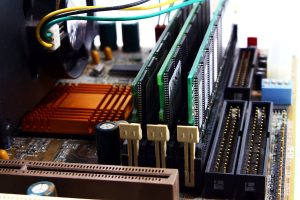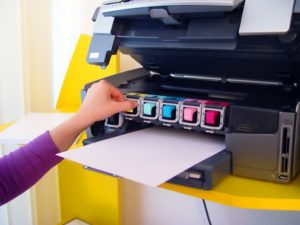5 Signs Your Businesses Computers Aren’t Working Properly

Every industry has adopted technology and digitized its operations. This has brought cost reductions and productivity benefits for businesses. But, if the computers slow down or shut down, it creates a whole new set of problems for a business.
Without functioning computers, businesses will lose communication, and it could lead to operations stalling. By not having the means to communicate or engage with customers, it can lead to a company losing sales. The loss of functioning computers could also affect production or service provision and cause a drop in sales and revenue.
Computer Is Slow or Keeps Freezing
If your company’s computers start to slow or freeze, it could be an issue with the space on your hard drive or random access memory (RAM). If your hard drive is 95% full, then your computer will struggle to run programs. Your programs will either run slowly, or the full hard drive could cause your computer to freeze. This occurs because software programs need to create temporary files to operate efficiently, so if there is no space to create temporary files, then the program will struggle to get anything done.
To create space in your hard drive, you need to delete unnecessary files like old temporary files, caches, update files, and old backups. Another solution would be to store large files, especially media files, in the cloud; that way, your hard drive is free to store documents. You could also buy a larger hard drive or save data on an external hard drive.
RAM is the computer hardware that enables your PC to run more than one task at the same time. As with everything, that ability has limits. To free up the RAM on your computer, you will need to reduce the number of programs running at the same time. Particularly applications that run in the background once you switch your computer on. You can disable these programs under the Startup Tab.
Your RAM could be too low for the programs that you are running. There are graphic heavy programs that need large amounts of RAM to operate, such as media editing programs. To solve this, you could buy more RAM and install it onto your computer.
If your computer is freezing, there are steps you can take to fix it:
- Open task manager by pressing and holding Ctrl+Alt+Delete
- Select Windows Explorer from the processes tab
- Click restart
If the above process does not work, then you can press and hold the power button to force a shutdown. If that doesn’t work, then remove the power cable or battery to turn off the computer or laptop.
If you’ve tried all of the troubleshooting options and your computer still isn’t working correctly or, if you are unsure about which hardware to get or how to install it into your computer, you can take it to a professional. You can click here to find laptop repair services near you. If your computer is beyond repair, you may want to consider replacing it with the latest model. But what should you do with your old computer? Don’t let it pile up in your office or throw it away carelessly. You can entrust it to an electronic recycling facility to ensure it is handled in the right and safe way. Additionally, if you’re concerned about protecting sensitive data on your hard drive, there are options for hard drive shredding from Atlanta.
Random Pop-Ups
If you start to notice random pop-ups on your computer, it could be a sign that malware is infecting your device. The malware could be trying to get you to click on an even more destructive virus. It could also be forwarding you adware to earn the hacker money. Not only are they an annoyance and potential threat to your computer, but it will also take up your computer’s RAM.
Adware is a lurking security threat that can be the gateway for more malware. Malware will eat up bandwidth, RAM, and frustrate your employees. To get rid of pop-ups, you will need to uninstall the responsible program or plugin. An antivirus scan can also help root out and eliminate pop-up malware.
Related : 15 Best Tech and Computer Magazines
Poor Internet Connection
If you are experiencing a slow internet connection, then there could be other traffic taking up your bandwidth. Most websites come with cookies, and your browser frequently creates caches to make browsing easier and faster. Web browser add-on features or plug-ins can also slow your internet connection.
If you notice that you don’t have an internet connection, it could be from a bad cable or phone line, which is easy to fix. But it could also be a symptom of a virus, problematic driver, bad network card or modem. A slow or dropped internet connection can affect communication and business processes like online sales, which is why you must take action to fix your internet connection.
You can clear your cookies and disable plugins within the browser menu. Your modem may be overworked or overloaded, so a modem/router reboot can work. If the problem continues to persist, then you should talk to your internet service provider (ISP) to inquire if the problem could be on their end.
Unable to Install Applications
Sometimes you may find that your computer will not install any new applications. Applications are not only necessary for productivity, but they could be necessary for regulatory compliance. This could be because your computer does not meet the minimum specs to install the application. Carefully read the specs required for the application and see if it matches what you have.
The most common issue is that you may not have enough space. You can easily solve this by deleting files and programs that you no longer need or use. You can also create space by deleting temporary files and emptying your Recycle Bin. Other issues could be hardware failures, storage space, and missing data.
Related : 10 Best CPU Temperature Monitor Tools for Windows (FREE)
Suspicious Activity
Did a program act weird? Did your mouse move without you touching it? Are programs opening and closing without your instruction?
If any of the above or anything suspicious happens, then you must become vigilant. Hopefully, it’s just a glitch, but it could also be a virus operating automatically, or it could have given a hacker remote access to your computer.
In 2019, there were 4 trillion intrusion attempts on computers. computer Viruses and hackers are after sensitive information and use that for commercial gain. Compromised data can not only cost you money, but it can also tarnish your brand.
First thing you should do is to immediately disconnect your PC from any network. This will stop it from spreading a potential virus as well as cut off remote access to potential hackers. Then you should immediately switch off your computer. After a few minutes, switch on the PC, while it is still off the network, and run an immediate antivirus scan. If nothing is spotted and the problem persists, then you should call in the experts.
Related : How to Recycle your Old Computer?
Efficient Computers, Efficient Business
Considering the amount of work done on computers and the internet, it should be no surprise that a PC can slow down. But a business has no time to waste, so you need to keep your computer operating at its optimum levels. A few good habits and fixes can have your business back on track.






